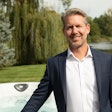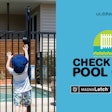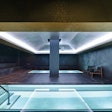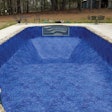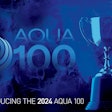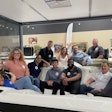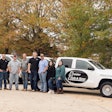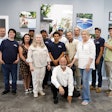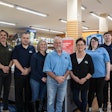Mid-June is a busy time of the year for Bob Blanda, owner of Mill Bergen Pools in Brooklyn, N.Y. Salespeople are swamped, construction crews are crazy and Bob is hard to get on the phone. We did eventually track him down in his car, driving from one work site to another.
"Right now, I could really use eight more guys who know what they're doing. But they're not around," he says. "Anybody who's worth their salt is busy, and if there is somebody floating around looking for work, chances are there's a good reason for it."
The situation isn't unique to Mill Bergen or New York. Pool professionals from the Rust Belt to the Sun Belt and everywhere in-between face the same shortages of good workers in all areas of operation — retail, service and construction.
Blanda, who in addition to holding down a demanding day job volunteers his time on APSP's board of directors and a host of councils and committees, currently serves as chairman of the Education Committee. It's that group, he says, that can do something about the skill and manpower gap by making sure both new and experienced water testers, pool cleaners and construction workers have what they need to succeed in today's workplace.
With that goal in mind, the committee has made some significant changes to APSP's educational offerings that Blanda hopes will bear fruit, including adding new courses, breaking professional certification programs into smaller pieces and creating online learning and test-taking opportunities aimed at accommodating younger learners and improving outcomes. But as big as those ideas are, and as much potential as they have to transform APSP's industry education, Blanda says the lack of able and willing workers won't change until we improve our profile among career-seekers.
"I really want to reach the young people," he says. "So many of them have been misinformed about life and told that if you go to college you'll get out, find a good job and everything will be great. Well, that dream died 20 years ago.
"There are so many kids just floundering and out of work. This is an industry where you can make a very nice living and there is plenty of work out there. It's just not popular and it's not well exposed. We need to do a better job of that and get some young people in here and get them educated. I'm getting old."
New Directions
In January, APSP took a big step toward improving both industry education and recruitment of young workers when it hired Maria O'Hara to head up its education program. A whirlwind three weeks of meeting, greeting and preliminary steps at formulating a plan culminated in a trip to The Pool & Spa Show in Atlantic City at the end of that first month. Naturally, she was curious to sample the show's educational offerings and came away impressed by what she saw.
"The courses I sat in on were really tough and rigorous," says O'Hara, a training professional with 20 years' experience in association and corporate education. "The level of technical sophistication was impressive, as well as the reference to ANSI/APSP/ICC standards."
Like Blanda, O'Hara believes the association's primary mission is to both to educate existing workers and teach basic skills to newcomers. In other words, course offerings and professional certification programs need to address the full range of experience.
Take the Certified Building Professional certification, for example. In the past, students had one option: buy a book, read it completely, then pass a difficult exam. There were courses designed to help with test preparation offered at trade shows, but again, they often tried to cover too much and left participants feeling either overqualified or overwhelmed.
"Now we're moving toward a modular system," Blanda says. "You can take just three modules one year, for example, then another one the next year and some more the years after that. You will have to pass the test for certification eventually, but you can learn it all piecemeal."
In addition, students have an expanding menu of options for taking the courses. Live, in-person instruction at regional shows and the International Pool | Spa | Patio Expo (Oct. 30-Nov. 4 in New Orleans) will always be offered, but now students can attend live virtual classes and online self-paced classes, too.
"So for somebody who doesn't have the time to block off five straight days, it's a good option," Blanda says. "People seem to like the virtual training."
Retail Realities
Like workers on the construction side, retail personnel have their own APSP certification to work toward — the Retail Sales Associate Program, or RSAP. Traditionally, students purchased a book and were tested on the contents of that book, much as with the CBP. Students used a workbook issued along with the textbook to help them prepare for and pass the exam, and could also take APSP's Retail Boot Camp for extra training.
"We've offered that a couple of times already this year, then we're going to be doing it again just before Expo," says Gigi Carder, who chairs the APSP Retail Council in addition to serving as retail merchandising manager for the global biotech and chemical company Lonza. "It's kind of a down-and-dirty, let's-get-a-lot-of-information-in thing, an overview of retail."
Response to the Boot Camp has been mixed, she admits, with groups registering the same objection some on the pool-building track had to their "overview" courses.
Always receptive to the needs of its member, APSP made some changes to improve the Boot Camp, spending less time on the basics and more on advanced material, knowing retailers didn't usually bring their brand-new hires to Atlantic City, Orlando, Las Vegas and the like.
Carder says these tweaks will help retailers train their people to be better clerks, testers, accountants and brand ambassadors. But she's even more enthusiastic about a bigger change that's coming to retail education.
"What we're really excited about — and we want to make this what dealers want, we're being very careful about that — is something called the Retail Masters Certification Program," Carder says. "It's broken up into smaller parts, and you can work toward Masters Certification if you go through the whole thing."
The new program addresses the fact that not everyone is in the same stage of professional development, and not every storeowner wants the same level of certification for every employee.
"It's for first-time employees all the way to people who are working their way toward management," Carder explains. "How many times have you gone to seminars and walked away thinking, 'That was an awful lot of great stuff, but I'm not sure how much of it I'm going to be able to put to use right away?' I know retailers need to get their employees up and going, but you really need to make sure it's done right. It has to be something even a new person can soak in and begin to apply right away, and it has to be in smaller doses."
The initial RSAP segment of the new certification will remain the same, with the exception of expanded virtual-learning options. Added topics such as logistics, communication, computer skills and accounting will round out the Masters Certification.
Aren't some of these things covered by manufacturers during seminars or demos arranged by distributors? They can be, Carder concedes, but there's a crucial difference.
"Manufacturers do step up, but who teaches things when they aren't also trying to sell them something?" she says. "Say you get a POS system. That's a great thing. But without a good basis of retail computer skills, people will only learn to use it in a limited way."
Carder cites customer visits while wearing her Lonza hat, where she'll survey groups of assembled retail employees with what they think is a strong working knowledge of the POS system in their stores.
"When I ask them, 'Can you tell me which of your customers have not been in for a water test this year?' I get that deer-in-the-headlights look," she says. "That information is available to them, and it's easy to find if you know what to do, but they don't have an IT department to call like I do.
"Given that, if APSP can't be the source of that kind of training, who can be?"
Bringing Computerized Testing to the Industry
Like building and retailing employees do, service personnel have their own unique set of educational needs, and employee/students come in with vast differences in experience and past coursework. O'Hara credits APSP for having broken service training into smaller pieces, a model that's being repeated for the other two industry segments.
Frank Goldstein, president of Chesapeake Aquatic Consultants LLC in Grason, Md., and instructor for APSP, explains the certification structure: "We have two levels of training, the Certified Maintenance Specialist and the Certified Service Technician. Those are classroom-driven. Then we have a third, higher level, which is the Certified Service Professional, or CSP."
Given the time and money (both of which are in constant short supply), Goldstein says he'd like to see more of that advanced training brought into the APSP tent, but for now he's excited about the changes taking place in virtual instruction and, especially, computerized exams at any of 600 PSI Services testing centers across the United States.
"I like the new testing a lot," he says. "You get instant feedback on the test and a report on what areas you were strongest and weakest in. That's crucial. When you tell people, 'We've been here for three days taking a class and then an exam, but you're going to have to wait for the test results for another three weeks,' that reduces the class's impact. This new method will be good not only for the students, but also for the Association, to see where they need to improve on the training programs themselves. Students having consistent problems with a certain part of the test could point to an issue with the materials, or maybe with the teachers. We'll have that real-time data to help us analyze that."
Goldstein's enthusiasm over the new instruction and testing methods doesn't diminish his feelings about old-fashioned, face-to-face teaching. Both virtual and in-person courses will be available to the industry in the coming year. In fact, O'Hara notes that APSP University is actually increasing the number of pre-show live sessions at the Expo this fall.
"In New Orleans we will be offering our certification courses," she says. "We'll have Pool and Spa Construction, which is good for the CBP exam. We will be offering CMS, CST, Certified Hot Tub Technician course and the Retail Boot Camp. Most years we have offered two or three certification courses, but this year we will have all five." (See the below sidebar and the following page to learn more about upcoming courses.)
What's clear from demographic and APSP research is the need to attract younger people to the association's indispensable courses and certification programs. Old methods are no longer enough.
"We know that millennials are more connected to technology than previous generations, and a quarter of them believe that their relationship to technology is what makes their generation unique," O'Hara says. "We are looking to attract and retain current and future members, especially millennials. They want and expect a professional career — and will look to APSP to provide state-of-the-art certification and education to help them."
O'Hara explains that all aspects of the educational and training process are being evaluated. As part of this evaluation over the past year, APSP has broadened its delivery methods to include virtual. "Now we are excited to bring computerized testing to the pool and hot tub industry," O'Hara says. "Millennials want a career in an industry that embraces technology and the future. Computerized testing is one way we can meet them where they are at and show there is a future for them."
"We have a great industry, and we just need to grow it," Blanda says. "It's time to get the youth involved and grow it up that way."
Hopefully when that happens, Blanda and others like him will be able to find the educated and dedicated help currently in such short supply.
What Gallup Research Tells Us About EducationCreating and maintaining loyalty is rooted in knowledge According to a 2016 Gallup Survey of pool owners sponsored by The Association of Pool & Spa Professionals, pool professionals are the most relied-on source of information about pool maintenance. And what's more, a recent APSP membership survey indicates that education and training is the No. 1 perceived benefit of membership. Members want access to education and training for themselves and their employees. "The Gallup consumer research findings are important because it tells us that the consumer trusts pool professionals," says APSP President and CEO Rich Gottwald. "But the onus is on the professional to make sure they are up to speed on the latest technology and committed to continuing education." Gottwald explains the importance of training and education as illustrated by the Gallup findings: "To put it another way, pool installers and the recommendations of other pool owners are the leading influences on pool installation decisions. If a pool owner loses trust through a bad retail or service professional experience, research tells us it will negatively influence the likelihood of another consumer installing a pool." Creating and maintaining loyalty is rooted in knowledge. APSP understands this and has positioned APSP University to deliver the necessary skills and technical knowledge to meet the demands of today's consumer. For a list of courses through the end of the year and beyond, see the schedule on the next page.
|
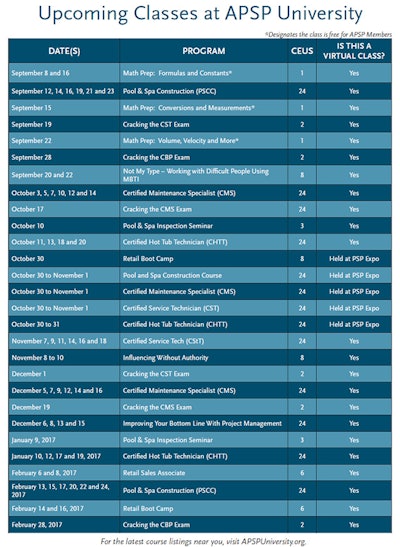 Click to enlarge
Click to enlarge
























